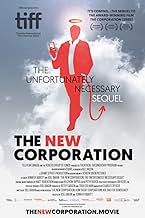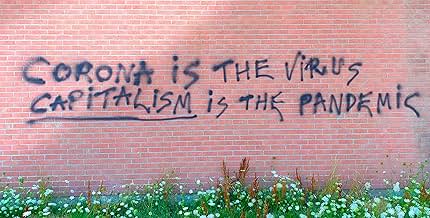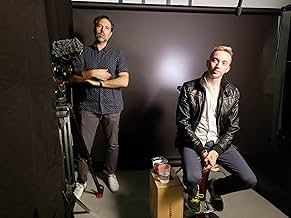Exposes how companies are desperately rebranding as socially responsible - and how that threatens democratic freedoms.Exposes how companies are desperately rebranding as socially responsible - and how that threatens democratic freedoms.Exposes how companies are desperately rebranding as socially responsible - and how that threatens democratic freedoms.
- Awards
- 1 win & 8 nominations total
- Directors
- Writer
- All cast & crew
- Production, box office & more at IMDbPro
Featured reviews
If you want to now how we got here and the terrible road we're headed down, watch this. If you're blinded by ideology and don't come away with something, then you're a lost cause. If not, this should galvanize you at least somewhat.
Quite an interesting documentary to watch, it does highlight the state of affairs with crony-capitalism and how it's making us point fingers at each other, rather than a bunch of massive global corporations which are reaping huge profits off the back of our taxes and simultaneously lowing our standards of living. We've been sold out by people in our governments, and will be worked to death to fund what amounts to corporate socialism.
It does lose focus at points, and repeats in a few places but overall I did enjoy watching it.
It does lose focus at points, and repeats in a few places but overall I did enjoy watching it.
Even though I'm totally on the capitalism-hating boundwagon, it's still hard to rate this film as a documentary regarding an unbiased, neutral look at a relative subject. Being essentially an open love letter to Bernie Sanders, Alexandria Ocasio-Cortez and all socialist activists in the west world, and likewise zealously bashing and pounding on Amazon, Facebook, Google, etc, this film shouldn't be sorted as a documentary.
How this film works, however, is regarded as an essay film which theorises certain attributes towards the "giant" corporations and their devastating and deadly effects on the present world, just "for a few dollars more". In this standpoint, the film is a wholesome and comprehensive work for it points out several pitfalls and valid issues within those corporations, builds up a hypothesis to generalize their conducts, and in the final third part arrives at a fully fleshed-out solution.
If you are looking for a documentary presenting or representing facts and realities, then this film is likely to disappoint. But if you are looking for a totally biased explanation and analysis of our modern universe, then this is definitely something to consider.
How this film works, however, is regarded as an essay film which theorises certain attributes towards the "giant" corporations and their devastating and deadly effects on the present world, just "for a few dollars more". In this standpoint, the film is a wholesome and comprehensive work for it points out several pitfalls and valid issues within those corporations, builds up a hypothesis to generalize their conducts, and in the final third part arrives at a fully fleshed-out solution.
If you are looking for a documentary presenting or representing facts and realities, then this film is likely to disappoint. But if you are looking for a totally biased explanation and analysis of our modern universe, then this is definitely something to consider.
I'm amazed by the number of reviewers who were surprised to find "socialist" or "left-leaning" commentators being interviewed for this documentary--especially those reviewers who mention the original documentary favorably. Since the thesis of the documentary is (essentially) that corporations are dangerous, I'm not sure who else they expected to be interviewed. The film features some of the same interviewees from the first film: Robert Reich, Naomi Klein, Noam Chomsky, Vandana Shiva, and so on. It does also feature a couple corporate representatives, but not the number that were featured in the longer and more in-depth first documentary.
As the film indicates with clips from Margaret Thatcher, Ronald Reagan and Milton Friedman, since the 1970's, a market-based neoliberal philosophy has come to dominate political dialogue to the point that de-regulation is a central mantra of conservatives the world over (not to mention most centrist liberals). I would challenge these reviewers who demand a more "fair and balanced" presentation to scour the internet for a mainstream right-wing politician, thinker or activist that is strongly against corporate consolidation of power. You won't find one. It would be difficult, but not impossible, do do so within the mainstream centrists (Democrats in the US, or liberal parties in other countries), as well.
On the other hand, if the demand is to present these interviews alongside those who speak on behalf of the corporation, we certainly don't need further examples of that: our lives are inundated with constant pro-corporate messages, whether explicitly in advertising, or implicitly in the various privatized systems we have to navigate on an everyday basis--you are reading this review on a website that has been owned by Amazon since 1998. The pro-corporate perspective is also represented in the first film, which is more broadly about the history of corporations and their general methods of operation; this "sequel" feels more like an addendum or appendix than something to be viewed in a vacuum. In other words, if you haven't seen the first film, you should watch that first, as it is certainly still relevant and revealing.
Chris Hedges is correct that it is hard to view the complex of issues presented currently without feeling a deep sense of despair. I think that is why the second half of the film, which I see here derided by others, is both important, and ironically the subject of such angst. We are at an impasse and many of us feel powerless to counteract global forces that seem to be spiraling toward inevitable destruction. To present this documentary without some iota of hope would not only be depressing, it would be irresponsible. In the internet age, where raising someone's ire is the surest way to generate traffic, and therefore revenue, we should take at least some time to focus on the causes that bring us together, not just the ones that piss us all off.
As the film indicates with clips from Margaret Thatcher, Ronald Reagan and Milton Friedman, since the 1970's, a market-based neoliberal philosophy has come to dominate political dialogue to the point that de-regulation is a central mantra of conservatives the world over (not to mention most centrist liberals). I would challenge these reviewers who demand a more "fair and balanced" presentation to scour the internet for a mainstream right-wing politician, thinker or activist that is strongly against corporate consolidation of power. You won't find one. It would be difficult, but not impossible, do do so within the mainstream centrists (Democrats in the US, or liberal parties in other countries), as well.
On the other hand, if the demand is to present these interviews alongside those who speak on behalf of the corporation, we certainly don't need further examples of that: our lives are inundated with constant pro-corporate messages, whether explicitly in advertising, or implicitly in the various privatized systems we have to navigate on an everyday basis--you are reading this review on a website that has been owned by Amazon since 1998. The pro-corporate perspective is also represented in the first film, which is more broadly about the history of corporations and their general methods of operation; this "sequel" feels more like an addendum or appendix than something to be viewed in a vacuum. In other words, if you haven't seen the first film, you should watch that first, as it is certainly still relevant and revealing.
Chris Hedges is correct that it is hard to view the complex of issues presented currently without feeling a deep sense of despair. I think that is why the second half of the film, which I see here derided by others, is both important, and ironically the subject of such angst. We are at an impasse and many of us feel powerless to counteract global forces that seem to be spiraling toward inevitable destruction. To present this documentary without some iota of hope would not only be depressing, it would be irresponsible. In the internet age, where raising someone's ire is the surest way to generate traffic, and therefore revenue, we should take at least some time to focus on the causes that bring us together, not just the ones that piss us all off.
I really liked the original The Corporation, so I was excited about this follow up. However, as many have mentioned this sequel is less of a documentary and more of a socialist propaganda; even if you agree with everything that is said and presented here (and as a left leaning person myself, I totally do), it offers very little in terms of an actual unbiased look at corporations like the first film did. In the end worth the watch if you are on the left side of the political spectrum, but know that it might end up just being another piece of your echo chamber.
Did you know
- TriviaThis program documentary was funded by the biggest media corporation in Canada
- ConnectionsFollows The Corporation (2003)
- How long is The New Corporation: The Unfortunately Necessary Sequel?Powered by Alexa
Details
- Release date
- Country of origin
- Official sites
- Language
- Also known as
- Новая корпорация: К несчастью необходимый сиквел
- Filming locations
- Production companies
- See more company credits at IMDbPro
- Runtime1 hour 45 minutes
- Aspect ratio
- 16:9 HD
Contribute to this page
Suggest an edit or add missing content

Top Gap
By what name was The New Corporation: The Unfortunately Necessary Sequel (2020) officially released in India in English?
Answer


















